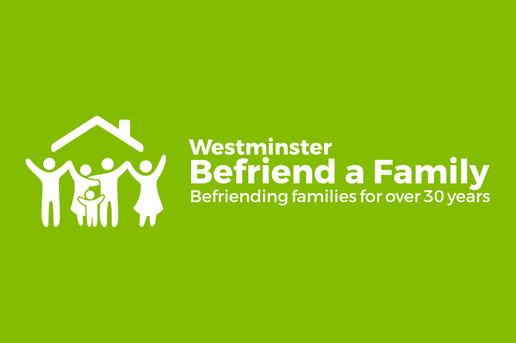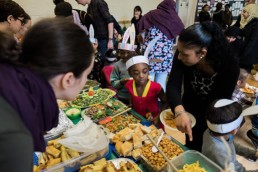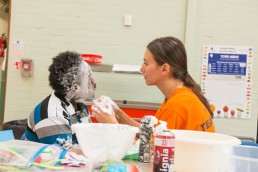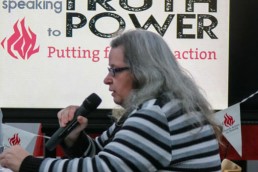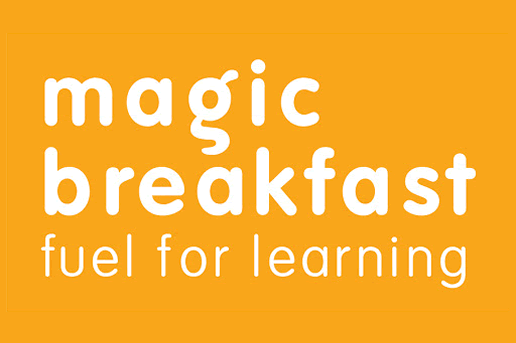Spotlight Interview - Westminster Befriend a Family
https://www.befriendafamily.co.uk
- How are you helping to tackle child poverty in London?
Westminster Befriend a Family (WBAF) enables people to break out of cycles of poverty, and mitigate its impact with the support and accompaniment of trained and supervised volunteers. We runs mentoring programmes for parents and young people in Westminster and the surrounding boroughs. ‘Mentoring for Mums’ is a programme we’ve just launched, that supports mums of children aged five who are facing challenges and who want to make positive changes in their lives with the support of a volunteer mentor. With support to build confidence, identify and achieve goals, find the specialist support needed and get unstuck, our programme helps mums into employment and education, as well as providing practical, emotional and social support. Similarly, ‘Broadening Horizons’ our mentoring programme for young people aged 10 – 24 offers regularly one-to-one support on a weekly basis from trained volunteers, with a goal-focused approach to setting aspirations, building connections and reducing loneliness.
- Share with our members something positive about your organisation’s achievement or service.
With the onset of the Coronavirus pandemic, since the first lockdown in March 2020, we managed to not only continue our services, but to massively increase our provision, tripling the number of people we supported in the last year as we expanded and introduced new programmes. We took everything online and after a few lumps and bumps, we’d got into the swing of things by April. Our brilliant volunteers were the linchpins in our success: they’ve helped us with volunteer recruitment drives, adapting to online working and their commitment to supporting families experiencing challenges has been unstinting, despite difficulties with communication and a hugely unpredictable environment. Because of the trusting relationships they built up, they were able to identify when families needed additional support with food, financial advice or IT equipment, and we were able to rapidly connect them to the right organisations so that their needs were met within days.
- What can other network members learn from you or find out more about through you?
Our volunteers have their fingers on the pulse of the community – because of the relationships they build up, they often get to hear about problems people might be experiencing before others are aware of them, which means we can respond quickly to individual or collective issues. With our signposting and referral system, we can make sure people are connected to the right services. We’re always keen to hear from organisations who support families and young people, so that we can connect them to the support they need, as well as taking referrals from them too.
- What would most help you achieve your goals?
We’re growing, and we’re always looking for more mentors – compassionate people with time to give, as well as an understanding of the challenges that some disadvantaged parents and young people are managing: Volunteers can apply here! We offer full training and ongoing support and supervision, as well as Tempo Timecredits so you and your mentee can grab a coffee together when you’re able to meet!
- Why did you join 4in10? What do you enjoy about being part of the 4in10 network?
As a small organisation, we don’t have much capacity to independently engage in policy and advocacy work, but we know that our experiences and the voices we can channel need to be heard. Being part of the 4in10 network enables us to contribute to the systemic change that tackles the root causes of the challenges that our families and young people face. The information I get from 4in10 is really relevant for me and helps me stay abreast of a vast and rapidly changing field of research and advocacy so that our programmes and funding applications are well-informed – thank you!
UK Poverty 2020/2021
UK Poverty 2020/2021: Why decisive action from central government matters now more than ever for our low-income London families.
“While we have all been in the same storm, we haven’t all been in the same boat.”- JRF
Reading the latest annual report from Joseph Rowntree Foundation (JRF) we see once again that London has the worst poverty rate within England. Prior to the pandemic low-income families in London were already struggling to make ends meet due to an unfair social security system that failed to protect them from the impact of the high costs of living in London.
This report incorporates pre-pandemic poverty data that reflects the world as we once knew it. It shows that low-income families who were already gripped by the clutches of poverty are the ones being further economically affected by COVID-19.
The JRF polling in May last year showed most low-income families on Universal Credit or working tax credits were forced to go without essentials, falling behind with rent payments and pushed further into debt as a result of the COVID-19 outbreak.
“It’s a damning indictment of our society that those with the least have suffered the most over the past decade and are now being hit hardest once again by the pandemic.” - Helen Barnard, JRF
The report highlights groups that were disproportionately affected; lone parents, who were more likely to be women, low paid and part-time workers, including BAME workers, as well as private and social renters.
All affected were likely employed in the hardest hit sectors (retail, food, accommodation, hospitality) as these jobs did not afford them the benefit of working from home.
For lone parents it was sadly inevitable then, that the lockdown restrictions would have hit them hardest not only because of the sector they work in, but also because of the sudden disruption to their childcare arrangements.
“The government continues to leave decisions on the support available to the worst off in our society to the last minute. It doesn’t have to be this way.” - JRF
It’s clear that central government must act now to alleviate the pressure that low-income families in London face on a daily basis to simply survive. Proactivity on their part is needed to address this unacceptable level of poverty. The report highlights the following solutions:
- As many people as possible need to be in good jobs. Retraining opportunities should be made available to diversify employability for those who have lost their jobs.
- Earnings for low income working families need to be improved.
- The Universal Credit uplift needs to be made permanent.
- The benefit system needs to be viewed as a vital public service, rooted in the shared understanding that everyone is entitled to have a decent standard of living.
- Low-cost housing provision needs to be increased and the gap between LHA and housing rent needs to be revised for low-income families.
We will continue to push for change in these areas with our network of members, highlighting these very pressing issues affecting the lowest income Londoners – particularly ahead of the budget in March. Join us by talking to your MP and letting them know why you want to see action on child poverty. Click here for all the information you need to take part.
4in10 Newsletter 07.01.2021
For 4in10 fortnightly newsletter with news, information, data, opportunities to influence with a new year feel, please click here.
Great Job Opportunity, News, Funding, Reports and More
Dear All
We hope you are well and coping with where we all find ourselves.
You may have seen that sadly, Laura Payne is moving on from 4in10 to a great new post at the end of January. This means we have an exciting new vacancy for our team leader. Can you see yourself running our amazing 4in10 network, championing London's diverse and tireless anti-poverty organisations, maintaining, creating and developing contacts with decision makers and those who influence and inform them while leading a small and diverse team? Do you have excellent people skills and experience of campaigning and collaboration? Job description is here and the closing date is midday on the 18th January. Please do share as widely as you can.
As before a return to full lockdown means the danger of yet another increase in Domestic Violence. This is an updated list of the help available:
- Childline has a 24 hour helpline for children 08001111 and web based support including a dedicated page for deaf children.
- Galop offer specific LGBT+ DV support and advice. Helpline 0800 999 5428 available 10 – 5 Monday – Friday and until 8pm on Wednesday and Thursday.
- Hestia have an app that can be downloaded to a mobile phone and safely hidden. The content is also available on line.
- Ikwro offer DV support for Middle Eastern and Afghan Women. Languages spoken are Farsi, Kurdish, Arabic, Dari, Pashto, Turkish, and English. Mon to Fri 9.30am-5.30pm 020 7920 6460 For out-of-hours emergencies call: Kurdish / Arabic / English 07846 275 246 Farsi / Dari / English 07846 310 157
- Karma Nirvana support victims of honour-based abuse and forced marriage. They run a helpline from 9-5 Monday to Friday on 08005999247
- NSPCC has advice for anyone worried about a child.
- Refuge offer advice and information for both women and men experiencing DV and now include information on dealing with Tech Abuse. They have a 24 hour free emergency number 08082000247.
- Sign Health offer support for deaf people suffering DV.
- Silent Solutions in an emergency Dial 999. Listen to the questions from the 999 operator. Respond by coughing or tapping the handset if possible. If prompted press 55 – this lets the operator know it is a genuine emergency and you will be put through to the police who can trace the call. For more information.
- Southall Black Sisters this is not an emergency help line. Mon to Fri from 9am-5pm 0208 571 9595 or email info@southallblacksisters.co.uk
- Stonewall DV advice and information for the LGBT+ community.
- Surviving Economic Abuse have updated their information in relation to Covid.
- Women's Aid have a covid specific section on their website
From our members and friends:
- Big Issue asked a range of anti-poverty campaigners what progress they thought had been made in 2020, and what must be done in 2021 to lift people out of poverty for good.
- Child Poverty Action Group are collecting evidence on how social security changes have affected the wellbeing of children and families. They are looking for information both from individuals themselves and those providing services or advice.
- Education Policy Institute have published a report finding a positive impact from graduates working in early years setting on children's long term outcomes, the report also demonstrates that their presence is not a "silver bullet" for improving young children's attainment.
- High Pay Centre has published research claiming that by January 6th 2021, the top 100 paid CEO's will have earned as much in the year as the average annual full time worker's wage.
- Home-Start Richmond, Kingston and Hounslow are currently offering support to isolated families with a child under 5. This includes regular telephone support, help with financial worries, housing or relationship issues and guidance on parenting in the early years including Ideas and activities to keep children active at home.
- The IFS Deaton Review of Inequalities New Year Message is a stark reminder of the danger of ignoring inequality.
- Joint Council for the Welfare of Immigrants want to learn about the experience of migrants during the Covid19 pandemic in relation to keeping themsleves and their families safe.
- Joseph Rowntree Foundation have published their 2020 Poverty Report and Findings.
- Red Card are running a free gambling awareness workshops for professionals and parents on 5th February from 6.30 – 8.30.
- Refugee Council are looking for signatures for a petition to allow child refugees parity with adults in sponsoring close family members to join them.
- Right to Remain have added two new sections to their 'tool kit'. The new Asylum Inadmissibility rules and an update to their EU Nationals pages.
- Shelter have updated their Covid19 webpage to take into account housing and rent related changes in relation to the national lockdown.
- TUC are arguing for employers to proactively offer furlough to working parents affected by school closures and for immediate access to SEISS for the self-employed.
4in10 and a group of our frontline medical members are planning a Webinar on the impact of poor housing on children's health and safeguarding and what practical steps that can be taken to change this from a health practitioners perspective. The provisional date for this is the 29th March 1 – 2.30. If you feel you have something you would like to contribute please get in touch. More details will be available next month.
Local Authority and Statutory Updates:
Many London Local Authorities have developed an elibrary service. This gives access to online books, magazines, comics, homework help and more. Examples below of what is available from some individual boroughs but do check your own borough's library website for more details:
- Barnet
- Brent
- Croydon
- Ealing
- Kensington and Chelsea
- Waltham Forest
- Hounslow have launched a swop shop for residents for children's clothes and toys and have created a way for families to give away items and request things they need. Send an email with the items to give away or needed.
- The Department of Culture, Media and Sport are hosting webinars on Winning Central Government Contracts and the New Social Value Model from 2pm-4pm, on the 20th January 2021, 3rd February and the 17th March.
- The Department for Education has confirmed it will go ahead with previously announced plans to increase the number of free laptops and 4G routers made available to disadvantaged children.
- Ofcom estimates that 9% of children in the UK (between 1.1 million and 1.8 million) do not have access to a laptop, desktop, or tablet at home and that more than 880,000 children live in a household with only a mobile internet connection.
- ONS state that only 51% of households earning between £6,000 and £10,000 have internet access.
- The DofE also updated their guidance on safeguarding children on the 30th December. It now includes homelessness or potential homelessness as a safeguarding concern and requires public bodies to refer families to a housing authority.
- GLA have a London Learning from Home resource site for parents and children to access resources and help.
- London Boroughs Faiths Network, the GLA and London Plus are running the pan-London Volunteering Summit 14th January 1.30 – 3.30. Free and online, this will address ways to support volunteers and volunteering in London.
- The Prime Minister stated that children eligible for free school meals would now receive supermarket vouchers similar to those provided during the first lockdown and during the summer and Christmas holidays. There is currently no information on how this is to be administered while schools are closed. Check individual local authority websites for updates.
Funding Opportunities:
- Local Connections Fund. The new round of this Big Lottery funding has just opened and is for projects tackling loneliness.
- Paul Hamlyn along with Comic Relief have launched a new Tech for Good digital development fund.
- Screwfix Foundation quarterly funding round ends in February. Bids should be in over the next two weeks for building or maintenance bids.
- Trust for London funding round ends on the 2nd February. Bids should be in very soon.
- Volant Charitable Trust has launched a new Covid19 response fund.
Very best wishes and as always please keep sharing information with us so we can share on...
Laura, Keisha and Liza
PS: Did you see the Member Spotlight in our last newsletter? Do let us know if you'd like to feature your work here too.
4in10 Newsletter 17.12.20
For 4in10 fortnightly newsletter with news, information, data, opportunities to influence with an end of year feel, please click here.
2021 Mayoral Election
Election for London Mayor and Assembly 2021
The election will be held on 6 May 2021 to elect the Mayor of London. It will be held simultaneously with elections for the 25 London Assembly members and other local elections. The position of Mayor of London is currently held by Sadiq Khan of the Labour Party and he is standing again as the Labour candidate, Shaun Bailey is the Conservative Party's candidate, Siân Berry is standing for the Green Party and Luisa Porritt is representing the Liberal Democrats. A number of other smaller parties are also standing.
Why does that matter to our sector?
The GLA also known as City Hall is London’s governing body and is responsible for implementing the Mayor’s Policies. Although limited in many ways by central government legislation and by financial constraints, these policies cover how London is policed, housing and house building, transport (TFL), the environment, health, culture and sport, fire services and London’s economy. They also support London’s Youth Assembly.
The Mayor is responsible for setting budgets and deciding on the GLA priorities for the four years they are in office. That includes how and if they will attempt to tackle poverty and inequality in our City. 4in10 try to influence these decisions and hold them to account where necessary to ensure low income, inadequate housing, equality of opportunity and of outcomes are on every agenda and at the forefront of the Mayor’s thinking but that can only be effective if you make your concerns heard.
It is worth noting that the Mayor is not responsible for the NHS, council housing, schools, social services, rubbish collection, street cleaning, parking permits and taxation all of which are governed either at local authority or national government level. However, they do have a voice in all these areas and provide a London wide representation.
How can we gain influence?
Getting the attention of the Mayor matters even in areas of government where they don't have direct control. They are regularly contacted by the media for stories and for comments on policy and can raise the profile of issues that may otherwise be ignored. Providing them with the information and detail they need to do this can only come from those of us who see first hand what the main difficulties are for our children and their families and why they matter. In other words, it is up to us to give them that detail in advance, when they are writing their policy documents and to ensure they understand what really matters to those they serve. It is also up to us to challenge broad statements they may release, asking what they see as the solutions to the impact of child poverty and how they will prevent this getting worse during their tenure if elected.
You can write directly to candidates to invite them to talk to groups online. You can look at candidates’ websites and see what they are saying. You can tell us what issues you would specifically like us to raise with candidates and we can try to do so on your behalf and you can ensure your service users know about the elections, are registered to vote and understand that, despite the limitations, who governs London matters to us all.
News, Funding Opportunities, Mayoral Elections and Members Spotlight
Dear All,
Thank you for sharing your work, your energy and your service information with us this year. We’ve have been grateful to share so much of your great work with the hundreds of organisations in the network, and to see so many of you at our online events. A particular warm welcome to the 52 members who joined our network during 2020.
There is no doubt that food poverty hit the headlines in a big way this year so we have pulled together here some work from national players as sources for useful campaign and food provision information:
- ASDA are providing free hot and cold meals for children under 16 at all of its stores until 31st Dec
- Children’s Right 2 Food has a fantastic visual dashboard showing the links at every point between low income, food insecurity and nutrition.
- Independent Food Aid Network with a strong history of campaigning against food poverty they also have an interactive map of their food banks, often part of wider community initiatives, and may have different access criteria.
- Magic Breakfast helped get the school breakfast bill through its first reading and provides breakfasts in schools for children living with food poverty. Please do read our Spotlight on Magic Breakfast at the end of this newsletter.
- Sustain tireless campaigners against food poverty. Read their report on London’s Food Response to Covid and lessons to be learned and their blog on Holiday Food Provision.
- Trussell Trust have announced an update to their strategic goals. They are now, changing communities, changing policy, and changing minds. They continue to have a list of their affiliated and supported local foodbanks all of which use a voucher system to access.
- UNICEF are for the first time in history helping feed children in the UK.
- More locally, Hackney Migrants and North London Action for the Homeless have joined forces with Eat Hackney to produce a Vegan Cookbook to fund their work. For a donation of £8.00 or more this is being made available to our readers with a special later order deadline than the one specified on their website.
Looking ahead to next year we are mindful of the upcoming London Mayoral Elections and what these might mean to London. We have written an explainer for why they matter to our sector and how you can influence policy for the next four years. We will be lobbying the candidates ahead of the elections, if you or any of the families you support would like to raise issues with us – please do let us know. It is worth noting that many of London’s citizens are not registered to vote and unless they are registered they will not be able to take part in this or any election.
We will also be running London Challenge Poverty Week again later in the year, so do confirm if you’d like to be involved in any of the planning or creative projects for the week.
From our members and friends:
- Acting Out in partnership UCL, Pempeople and The Ubele Initiative are looking for young people aged 18 – 25 living in Peckham, the Old Kent Road or Brixton to take part and help create film and creative content that expresses how young people feel about their neighbourhood, changes that are happening and their hopes for the future. The next workshop is on 13th January from 6.30 – 8.30pm. To reserve a place on the workshop please contact Kelsea Sellars.
- ATD4th World and Just Fair have produced a video to mark World Human Rights Day and they are hosting a webinar on January 21st from 11-1.30 with Amnesty UK to illustrate how human rights are a ‘Bridge out of Poverty’.
- Article 39 and a number of other organisations working in the youth criminal justice field have produced a report calling for an end to child imprisonment.
- Children’s Rights Alliance for England have led on and produced a new report from 90 organisations, a submission to the United Nations Committee on the Rights of the Child warning the many ways that children’s rights are “worryingly low” on the UK government’s political agenda. 4in10 contributed.
- CPAG have released another Poverty in the Pandemic report highlighting the impact Covid has had on already low-income families.
- Early Years Sector Coalition have launched a new campaign Birth to Five Matters to develop guidance for the sector, by the sector.
- Health Foundation and the Institute of Health Equity have published Build Back Fairer the Covid-19 Marmot Review on Health Inequalities not just in light of Covid but highlighting how inequalities that were already present have just been exacerbated by the virus.
- Ipsos Mori poll showed that 62% of the public support the £20 uplift to Universal Credit.
- Joseph Rowntree Foundation have published a new report on Destitution in the UK and made the slides of their webinar on the topic available online. Their annual report, UK Poverty 2020, will be launched by a Zoom webinar on January 15th at 11am.
- Maternal Mental Health Alliance has commissioned member the Centre for Mental Health to produce a report on the challenges the voluntary sector is facing and witnessing as a result of Covid. Please complete this 10-minute survey. Deadline 8 January but pre-Christmas would help.
- Renters Reform Collective is a new coalition of 19 organizations dedicated to housing issues; who have come together to campaign for a second reading of the renters reform bill to ensure that legislation improves the safety, security and condition of privately rented homes.
- Revolving Doors have launched a survey looking at the experiences of 18-25 year olds’ experiences of policing. The aim is to inform the National Police Chief Council to develop their strategy for policing and young people. The survey should take participants about five minutes to complete. They will also have the option to enter a prize draw for a chance to win one of four £50 Amazon vouchers. Deadline is 1st January.
- Scope have released new figures showing how families with disabled children have been ‘pushed to the brink’ during this pandemic.
- Shaw Trust has partnered with the DWP to manage JETS (Job Entry Targeted Support). This is a new initiative backed by a £238 million government investment and is dedicated to supporting those left jobless due to Covid-19.
- Young Roots have been chosen to be the recipient of Aoife Hinds participation in BBC1’s Celebrity Mastermind on the 9th January. We wish her the best of luck.
Local Authority and Statutory Updates and Participation Opportunities :
- All Party Parliamentary Group on Poverty is meeting on Zoom on Thursday 14th January at 2pm – 3:30pm. They are calling for submissions on the impact of ending the temporary £20 uplift in universal credit and tax credits in April 2021, as well as the impact of not extending the uplift to legacy and other benefits during the Covid-19 pandemic. They are asking organisations for short written submissions of the key points the APPG should consider to inform its representations to Government. Please send these on email by the 10th January stating whether you would be available and willing to give evidence at the meeting. The Zoom link is here. But you must let them know you plan to attend.
- Barnet Council has received just over £986,000 from the government’s COVID Winter Grant Scheme. Working in partnership with the Young Barnet Foundation, the grant scheme supports families and other households financially affected by COVID-19 to meet food and heating bills. The fund will provide vouchers through a range of local partners, additional supplies to foodbanks and grant awards through the Barnet Community Response Fund.
- Employment allowance scheme. If your National Insurance bill was less than £100,000 in the last year you now need to claim your £4,000 discount. It is no longer being automatically applied.
- Equalities and Human Rights Commission have published their report on how Covid has affected equality in the UK.
- Hackney Have your say on how the borough allocate homes and support people in housing need. Read the proposals in full, find out what they would mean, and give your views. You can also speak to Council officers at Q&A sessions being held on the following dates and times: 12 January 2021 7-8:30pm; 27 January 2021 12 noon-1:30pm; 9 February 2021 6-7:30pm; 24 February 2021 4:30-6pm. You must pre-register to attend one of the sessions. If you would prefer to speak to someone on the telephone, you can call 020 8356 2929.
- Havering Adult Education College are offering a number of free or for £1.00 courses and provide a free laptop loan service for Havering residents taking online courses.
- Tower Hamlets are providing support for children in need during Christmas and February school holidays. Providing vouchers worth £25 to spend on food over the Christmas period. Any child who is eligible for statutory free school meals during term time will receive support. It is worth checking other Local Authority websites to see if they are doing the same or similar.
Funding Opportunities:
- Bailey Thomas have opened a new grant round to support organisations serving those with severe learning disability.
- Family Fund and BBC Children in Need are running an Emergency Essentials Funding Programme to fund items for individual families such as cookers and washing machines. They will also supply toys and other items where needed.
- Justice Together has launched a new strategy and grant rounds to ensure people who use the immigration system can access justice fairly and equally, so that they can get on with their lives. There are funds available for National level influencing projects that connect lived experience, front-line advice and influencing strategies to create lasting change.
- National Lottery Community Fund and The Department for Digital, Culture, Media & Sport have announced a new fund to reduce loneliness by helping people feel more connected. To be eligible, charities and community groups will have to have an income of £50,000 or less. The Local Connections Fund will be split into two rounds of funding – each with its own application window. The first application window will open on the 5th January 2021 and close on 26th January 2021. The second applications window will open in the summer.
- Youth Covid-19 Support Fund, open to grassroots youth clubs, uniformed youth groups, and national youth and umbrella organisations, to help to mitigate the impact of lost income during the winter period due to the coronavirus pandemic, and ensure services providing vital support can remain open.
To end a difficult year on a positive note, we are delighted to feature member organisation Magic Breakfast in our Spotlight feature below. If you would like to be the next organisation to be featured please let us know.
Thank you to all our great readers and remember this network depends on what you would like to share so please do keep information and knowledge coming.
We wish everyone a peaceful, happy and healthy 2021 and we are looking forward to working with you in the new year.
Laura, Keisha and Liza
Spotlight Interview - Magic Breakfast
https://www.magicbreakfast.com
- How are you helping to tackle child poverty in London?
Magic Breakfast partners with schools to provide children at risk of hunger with a free, nutritious breakfast each morning. School breakfasts boost children’s energy, concentration, behaviour and overall readiness to learn and can contribute to closing the educational attainment gap. However, we believe that no charity can end classroom hunger alone. That is why Magic Breakfast is also campaigning for long term, sustainable, Government investment in school breakfast provision, to ensure no child starts the day too hungry to learn.
- Share with our members something positive about your organisation’s achievement or service.
We’re particularly proud of how we’ve continued to provide breakfasts to children throughout the pandemic, including during all school holidays. During COVID-19 school closures, we adapted quickly and began delivering breakfast packs to schools and directly to children’s homes reaching 24,000 children. We know COVID-19 has impacted the communities we work with; 48% of our partner schools surveyed reported that child hunger has increased at their school as a result of the pandemic. So we’re pleased to be able to continue delivering breakfast food through the Christmas holidays – hunger does not take a break for the holidays!
- What can other network members learn from you or find out more about through you?
Our bread and butter is supporting schools to set up barrier free, stigma free, hunger focused school breakfast provisions. We have an amazing team of School Partners with years of experience of supporting and challenging schools to address classroom hunger.
We’re also happy to share more information about our campaigning strategy and tactics. We’re currently focusing on embedding youth led campaigning into our work.
- What would most help you achieve your goals?
Magic Breakfast is campaigning for school breakfast legislation – which would guarantee schools the funding they need to provide breakfasts to children at risk of hunger. In February, the School Breakfast Bill will have its second reading in Parliament.
We will be launching a supporter action that enables members of the public to write to their local MP about the Bill. We would be so grateful in 4in10 members could share this action through their networks and help promote the action on social media.
If your organisation wants to be more involved in supporting the School Breakfast Bill then we’d love to hear from you, please drop Jake an email at jake.atkinson@magicbreakfast.com.
- Why did you join 4in10? What do you enjoy about being part of the 4in10 network?
4in10 is a fantastic network that allows for organisations working across London to share knowledge and best practice to campaign more effectively against poverty. Many organisations and individuals in this network proudly supported the School Breakfast Bill in October and we cannot thank you enough for lending your support to help end child morning hunger. We look forward to working with the network in the New Year to continue our shared fight to end child poverty.
4in10 Newsletter:03.12.20
To read 4in10 fortnightly newsletter with news, information, opportunities to influence and much more please click here,
4in10 Newsletter: 19.11.20
For the 4in 10 Newsletter with all the news, information, data, funding and other opportunities and much more please click here.
4in10 Newsletter: 05.11.20
To access the 4in10 Newsletter with all information, data, reports, funding and other opportunities please click here.


